初中英语语法总结一般现在时
初中英语语法总结8种时态
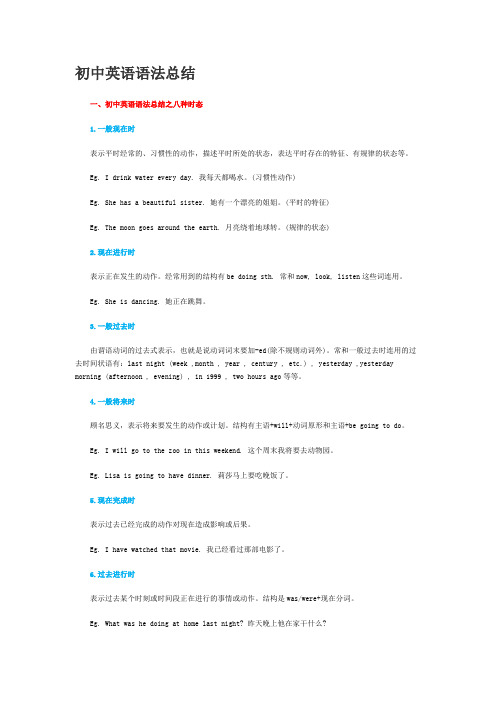
初中英语语法总结一、初中英语语法总结之八种时态1.一般现在时表示平时经常的、习惯性的动作,描述平时所处的状态,表达平时存在的特征、有规律的状态等。
Eg. I drink water every day. 我每天都喝水。
(习惯性动作)Eg. She has a beautiful sister. 她有一个漂亮的姐姐。
(平时的特征)Eg. The moon goes around the earth. 月亮绕着地球转。
(规律的状态)2.现在进行时表示正在发生的动作。
经常用到的结构有be doing sth. 常和now, look, listen这些词连用。
Eg. She is dancing. 她正在跳舞。
3.一般过去时由谓语动词的过去式表示,也就是说动词词末要加-ed(除不规则动词外)。
常和一般过去时连用的过去时间状语有:last night (week ,month , year , century , etc.) , yesterday ,yesterday morning (afternoon , evening) , in 1999 , two hours ago等等。
4.一般将来时顾名思义,表示将来要发生的动作或计划。
结构有主语+will+动词原形和主语+be going to do。
Eg. I will go to the zoo in this weekend. 这个周末我将要去动物园。
Eg. Lisa is going to have dinner. 莉莎马上要吃晚饭了。
5.现在完成时表示过去已经完成的动作对现在造成影响或后果。
Eg. I have watched that movie. 我已经看过那部电影了。
6.过去进行时表示过去某个时刻或时间段正在进行的事情或动作。
结构是was/were+现在分词。
Eg. What was he doing at home last night? 昨天晚上他在家干什么?7.过去将来时表示过去的某时以后将要发生的动作。
初中英语语法八大时态总结
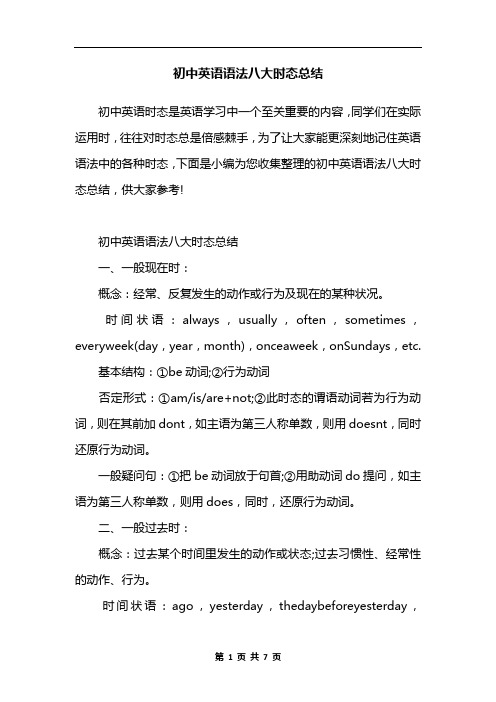
初中英语语法八大时态总结初中英语时态是英语学习中一个至关重要的内容,同学们在实际运用时,往往对时态总是倍感棘手,为了让大家能更深刻地记住英语语法中的各种时态,下面是小编为您收集整理的初中英语语法八大时态总结,供大家参考!初中英语语法八大时态总结一、一般现在时:概念:经常、反复发生的动作或行为及现在的某种状况。
时间状语:always,usually,often,sometimes,everyweek(day,year,month),onceaweek,onSundays,etc.基本结构:①be动词;②行为动词否定形式:①am/is/are+not;②此时态的谓语动词若为行为动词,则在其前加dont,如主语为第三人称单数,则用doesnt,同时还原行为动词。
一般疑问句:①把be动词放于句首;②用助动词do提问,如主语为第三人称单数,则用does,同时,还原行为动词。
二、一般过去时:概念:过去某个时间里发生的动作或状态;过去习惯性、经常性的动作、行为。
时间状语:ago,yesterday,thedaybeforeyesterday,lastweek(year,night,month),in1989,justnow,attheageof5,oneday,longlongago,onceuponatime,etc.基本结构:①be动词;②行为动词否定形式:①was/were+not;②在行为动词前加didnt,同时还原行为动词。
一般疑问句:①was或were放于句首;②用助动词do的过去式did提问,同时还原行为动词。
三、现在进行时:概念:表示现阶段或说话时正在进行的动作及行为。
时间状语:now,atthistime,thesedays,etc.基本结构:am/is/are+doing否定形式:am/is/are+not+doing.一般疑问句:把be动词放于句首。
四、过去进行时:概念:表示过去某段时间或某一时刻正在发生或进行的行为或动作。
初中所有英语时态
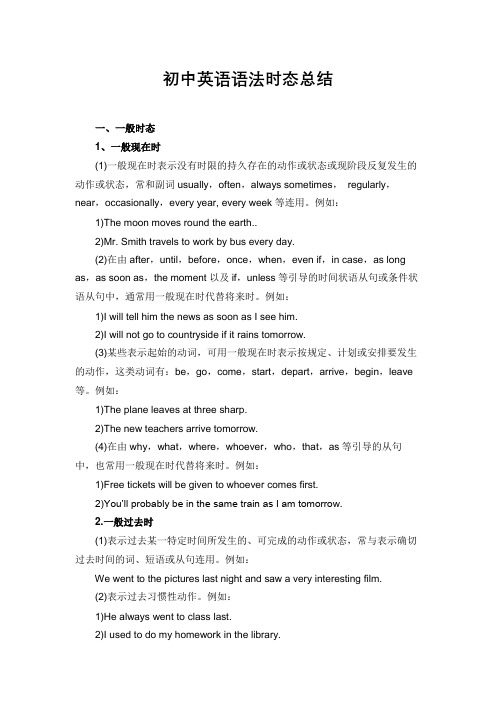
初中英语语法时态总结一、一般时态1、一般现在时(1)一般现在时表示没有时限的持久存在的动作或状态或现阶段反复发生的动作或状态,常和副词usually,often,always sometimes,regularly,near,occasionally,every year, every week等连用。
例如:1)The moon moves round the earth..2)Mr. Smith travels to work by bus every day.(2)在由after,until,before,once,when,even if,in case,as long as,as soon as,the moment以及if,unless等引导的时间状语从句或条件状语从句中,通常用一般现在时代替将来时。
例如:1)I will tell him the news as soon as I see him.2)I will not go to countryside if it rains tomorrow.(3)某些表示起始的动词,可用一般现在时表示按规定、计划或安排要发生的动作,这类动词有:be,go,come,start,depart,arrive,begin,leave 等。
例如:1)The plane leaves at three sharp.2)The new teachers arrive tomorrow.(4)在由why,what,where,whoever,who,that,as等引导的从句中,也常用一般现在时代替将来时。
例如:1)Free tickets will be given to whoever comes first.2)You’ll probably be in the same train as I am tomorrow.2.一般过去时(1)表示过去某一特定时间所发生的、可完成的动作或状态,常与表示确切过去时间的词、短语或从句连用。
初中英语语法——一般现在时知识点总结归纳资料讲解
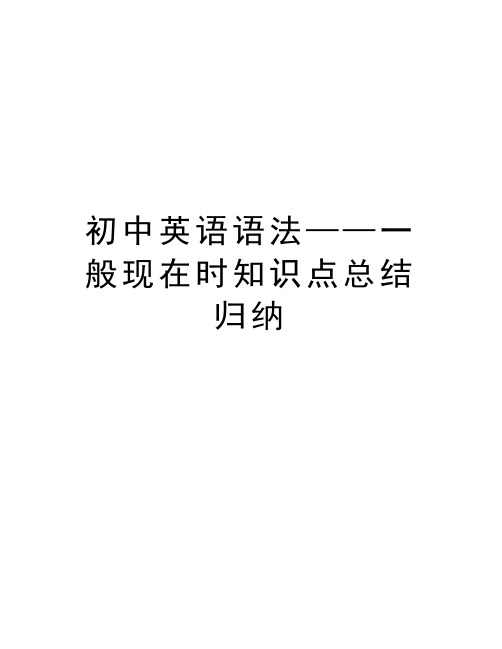
初中英语语法——一般现在时知识点总结归纳初中英语语法——一般现在时知识点总结归纳一般现在时——表示一般性,经常性的动作或一般性事实。
概念:表示经常发生的动作或经常存在的状态。
常和 always , often , usually , sometimes , every day 等表时间的状语连用。
如:1) I go to school every day . 我每天都去学校。
(表经常)2) He is always like that . 他总是那样。
(表状态)构成:1) 主语 + be (am / are / is ) +……2) 主语 + 实义动词/三单动词+ …【解析】1、含有be动词的句子He is a teacher.The girl is very beautiful.Tim and Jack are students.★变疑问句将be动词移到句首Is he a teacher?Is the girl very beautiful?Are Tim and Jack students?★变否定句在be动词后面加notHe is not a teacher.The girl is not very beautiful.Tim and Jack are not students.★肯定回答及否定回答Yes, he is. / No, he is not.Yes, she is. / No, she is not.Yes, they are. / No, they are not.2、不含有be动词的句子,即含有一般动词的句子。
(1)第三人称单数及单数名词He likes books.She likes him.The dog likes bones.★变疑问句在句首加does, 动词变为原型Does he like books?Does she like him?Does the dog like bones?★变否定句在主语及动词之间加doesn't, 动词变为原型,原句中的动词不再有第三人称变化。
初中英语语法总复习初中英语语法一般现在时专题讲解

初中英语语法总复习初中英语语法一般现在时专题讲解初中英语语法一般现在时专题讲解一般现在时:表示通常性、规律性、习惯性的状态或者动作(有时间规律发生的事件)的一种时间状态。
[基本结构]一般现在时的基本结构一般现在时除主语是第三人称单数时谓语动词要加s外,一律用动词原形。
例句:I go to school at 6 every morning. 每天早上我七点去上学。
Summer follows spring. 春天之后是夏天。
The sun rises in the east. 太阳从东方升起。
I learned that the earth goes around the sun when I was in primary school. 我在小学就学过地球是围绕太阳转的。
Pride goes before a fall. 骄者必败。
[时态详解]一般现在时最详细解析1) 描述当前时间内经常出现、反复发生的动作或存在的状态。
在这种情景中,句子常带有表示频率的时间状语:always ,everyday , often , once a week (month , year , etc.) , sometimes , seldom , usually等等,以表示句中的动作或状态是习惯性的、经常性的。
例如:They raise ducks as a sideline .他们以养鸭为副业。
She doesn't often write to her family, only once a month. 她不常给家里写信,仅一月一封而已。
I cycle to work every day .我每天骑自行车上班。
It seldom rains here .这儿很少下雨。
2)仅为了描述状态、性质、特征、能力等等。
这里的目的是为了“描述现阶段的动作或状态",其重点"不是强调动作发生的时间、或进行的状态"。
初中英语语法八大时态总结完整版
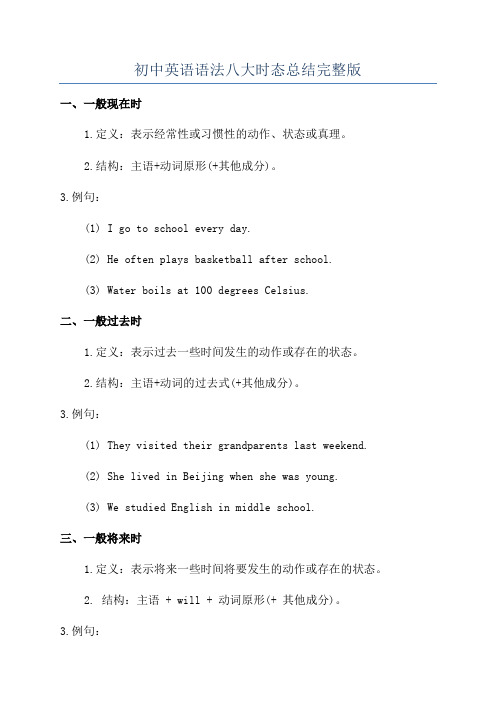
初中英语语法八大时态总结完整版一、一般现在时1.定义:表示经常性或习惯性的动作、状态或真理。
2.结构:主语+动词原形(+其他成分)。
3.例句:(1) I go to school every day.(2) He often plays basketball after school.(3) Water boils at 100 degrees Celsius.二、一般过去时1.定义:表示过去一些时间发生的动作或存在的状态。
2.结构:主语+动词的过去式(+其他成分)。
3.例句:(1) They visited their grandparents last weekend.(2) She lived in Beijing when she was young.(3) We studied English in middle school.三、一般将来时1.定义:表示将来一些时间将要发生的动作或存在的状态。
2. 结构:主语 + will + 动词原形(+ 其他成分)。
3.例句:(1) I will go to the park tomorrow.(3) We will have a party next week.四、现在进行时1.定义:表示现在正在进行的动作。
2. 结构:主语 + am/is/are + 动词-ing(+ 其他成分)。
3.例句:(1) She is reading a book right now.(2) They are playing soccer in the park.(3) We are having dinner at the moment.五、过去进行时1.定义:表示过去一些时间正在进行的动作。
2. 结构:主语 + was/were + 动词-ing(+ 其他成分)。
3.例句:(1) He was watching TV at 8 o'clock last night.(2) They were traveling in Europe during summer vacation.(3) We were studying when the phone rang.六、将来进行时1.定义:表示将来一些时间正在进行的动作。
初中英语语法八大时态总结(完整版)
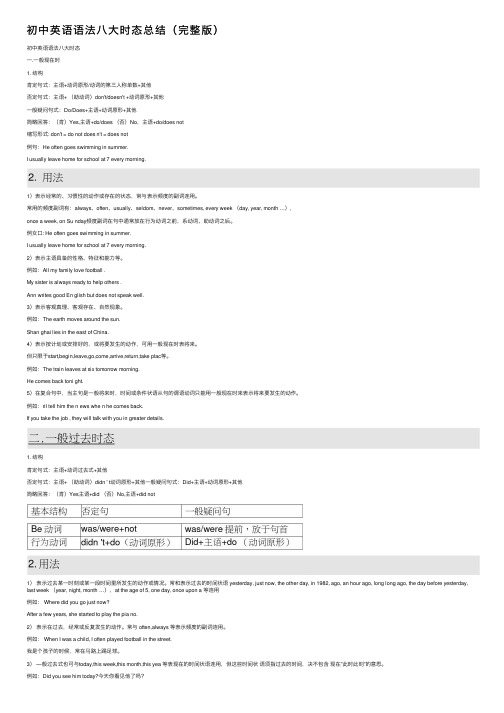
初中英语语法⼋⼤时态总结(完整版)初中英语语法⼋⼤时态⼀.⼀般现在时1. 结构肯定句式:主语+动词原形/动词的第三⼈称单数+其他否定句式:主语+ (助动词)don't/doesn't +动词原形+其他⼀般疑问句式:Do/Does+主语+动词原形+其他简略回答:(肯)Yes,主语+do/does (否)No,主语+do/does not缩写形式: don't = do not does n't = does not例句:He often goes swimming in summer.I usually leave home for school at 7 every morning.1)表⽰经常的、习惯性的动作或存在的状态,常与表⽰频度的副词连⽤。
常⽤的频度副词有:always、often、usually、seldom、never、sometimes, every week (day, year, month …),once a week, on Su nday频度副词在句中通常放在⾏为动词之前,系动词、助动词之后。
例⼥⼝: He often goes swimming in summer.I usually leave home for school at 7 every morning.2)表⽰主语具备的性格、特征和能⼒等。
例如:All my family love football .My sister is always ready to help others .Ann writes good En glish but does not speak well.3)表⽰客观真理、客观存在、⾃然现象。
例如:The earth moves around the sun.Shan ghai lies in the east of China.4)表⽰按计划或安排好的,或将要发⽣的动作,可⽤⼀般现在时表将来。
初中英语语法知识之一般现在时
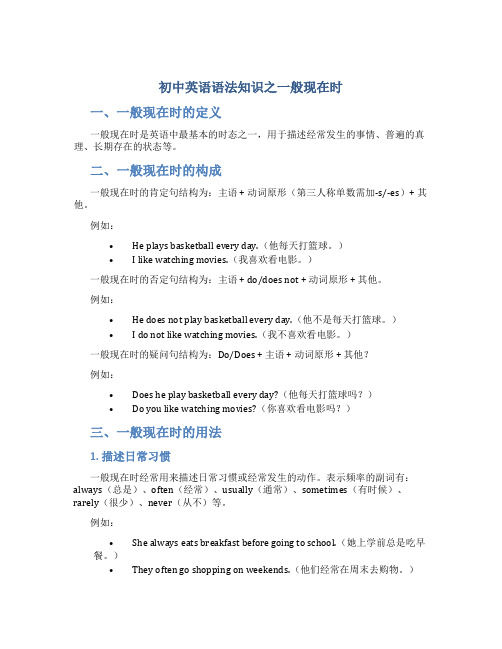
初中英语语法知识之一般现在时一、一般现在时的定义一般现在时是英语中最基本的时态之一,用于描述经常发生的事情、普遍的真理、长期存在的状态等。
二、一般现在时的构成一般现在时的肯定句结构为:主语 + 动词原形(第三人称单数需加-s/-es)+ 其他。
例如:•He plays basketball every day.(他每天打篮球。
)•I like watching movies.(我喜欢看电影。
)一般现在时的否定句结构为:主语 + do/does not + 动词原形 + 其他。
例如:•He does not play basketball every day.(他不是每天打篮球。
)•I do not like watching movies.(我不喜欢看电影。
)一般现在时的疑问句结构为:Do/Does + 主语 + 动词原形 + 其他?例如:•Does he play basketball every day?(他每天打篮球吗?)•Do you like watching movies?(你喜欢看电影吗?)三、一般现在时的用法1. 描述日常习惯一般现在时经常用来描述日常习惯或经常发生的动作。
表示频率的副词有:always(总是)、often(经常)、usually(通常)、sometimes(有时候)、rarely(很少)、never(从不)等。
例如:•She always eats breakfast before going to school.(她上学前总是吃早餐。
)•They often go shopping on weekends.(他们经常在周末去购物。
)2. 表达客观事实或普遍真理一般现在时也被用来表达客观事实或普遍真理。
例如:•The Earth revolves around the sun.(地球绕太阳运行。
)•Water boils at 100 degrees Celsius.(水在100摄氏度沸腾。
- 1、下载文档前请自行甄别文档内容的完整性,平台不提供额外的编辑、内容补充、找答案等附加服务。
- 2、"仅部分预览"的文档,不可在线预览部分如存在完整性等问题,可反馈申请退款(可完整预览的文档不适用该条件!)。
- 3、如文档侵犯您的权益,请联系客服反馈,我们会尽快为您处理(人工客服工作时间:9:00-18:30)。
初中英语语法总结——动词的时态
英语的时态主要体现在谓语动词上,用谓语动词的不同形式来表示。
其意义主要是说明动作、状态发生的时间。
下面我们分别来讲解:
(一)一般现在时
1、一般现在时的用法
一般现在时主要用在以下几种情况下:
1)表示经常性或习惯性的动作,常与表示频度的时间状语连用。
如时间状语:every …, sometimes, at…, on Sunday等,例如:
I leave home for school at 7 every morning. 每天早上我七点离开家。
2)表示客观真理、客观存在或科学事实。
例如:
The earth moves around the sun. 地球绕太阳转动。
Shanghai lies in the east of China. 上海位于中国东部。
(注:这种情况不会随时间的变化而变化,是客观存在的真理,所以用一般现在时就可以,不必使用其他时态。
)
3)表示格言或警句。
例如:
Pride goes before a fall. 骄者必败。
注意:2)、3)的用法如果出现在宾语从句中,即使主句是过去时,从句谓语也要用一般现在时。
(分析:此句中that the earth is round是一个句子,作为大句子中proved 的宾语,因此这个句子叫做宾语从句,而Columbus proved……为主句。
可以看出,主句是用的过去时,而从句却用了一般现在时,因为从句是描述的一个永恒不变的真理,不随时间变化。
)
4)表示现在时刻的状态、能力、性格、个性。
例如:
I don't want so much. 我不想要那么多。
Ann writes good English but does not speak well.安英语写得不错,讲的可不行。
2、一般现在时在使用时要注意“三单形式”的变化。
即动词的主语为第三人称“他、她、它或针对一个人的人名、称呼等”(如he、she、it、Li Ming、My sister等)的时候,动词要用第三人称单数形式。
三单动词的变化规则:
(1)一般情况下,直接加-s。
(2)以s. x. sh. ch. o结尾,加-es。
(3)以“辅音字母+y”结尾,变y为i, 再加-es。
3、一般现在时用法专练:
(1)写出下列动词的第三人称单数
drink ________ go _______ stay ________ make ________
look _________ have_______ pass_______ carry ____
come________ watch______ plant_______ fly ________
study_______ brush________ do_________ teach_______
(2)用括号内动词的适当形式填空。
1)He often ________(have) dinner at home.
2)Daniel and Tommy _______(be) in Class One.
3)We _______(not watch) TV on Monday.
4)Nick _______(not go) to the zoo on Sunday.
5)______ they ________(like) the World Cup?
6)What _______they often _______(do) on Saturdays?
7)_______ your parents _______(read) newspapers every day? 8)The girl _______(teach) us English on Sundays.
9)She and I ________(take) a walk together every evening.
10)There ________(be) some water in the bottle.
11)Mike _______(like) cooking.
12)They _______(have) the same hobby.
13)My aunt _______(look) after her baby carefully.
14)You always _______(do) your homework well.
15)I _______(be) ill. I’m staying in bed.
16)She _______(go) to school from Monday to Friday.
17)Liu Tao _______(do) not like PE.
18)The child often _______(watch) TV in the evening.
19)Su Hai and Su Yang _______(have) eight lessons this term.
20)-What day _______(be) it today? It’s Saturday. (3)按照要求改写句子
1)Daniel watches TV every evening.(改为否定句)
___________________________________________________
2)I do my homework every day.(改为一般疑问句,作否定回答) ________________________________________________________ 3) She likes milk.(改为一般疑问句,作肯定回答)
_______________________________________________________ 4) Amy likes playing computer games.(改为一般疑问句,作否定回答) ________________________________________________________
5) We go to school every morning.(改为否定句)
_______________________________________________________ 6) He speaks English very well.(改为否定句)
___________________________________________________
7) I like taking photos in the park.(对划线部分提问)
________________________________________________________ 8) John comes from Canada.(对划线部分提问)
___________________________________________________
9) She is always a good student.(改为一般疑问句,作否定回答)
________________________________________________________ 10) Simon and Daniel like going skating.(改为否定句)
___________________________________________________ (4) 改错(划出错误的地方,将正确的写在横线上)
1) Is your brother speak English? __________________
2) Does he likes going fishing? __________________
3) He likes play games after class. __________________
4) Mr. Wu teachs us English. __________________
5) She don’t do her homework on Sundays. _________________。
